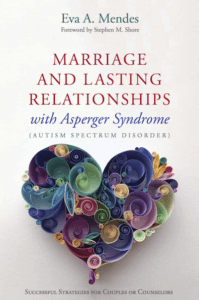
Guest post by Rutherford G (pseudonym)
Hi everyone! As you know, I am a person with Asperger’s, and this second part of my blog is a continuation of my favorite parts of Eva’s book. Sometimes being on the spectrum lends itself to having a difficult time, due to a plethora of reasons. The following excerpts are pieces of information that I have found particularly helpful, as they cover a wide variety of scenarios that can be difficult in a neurodiverse relationship. I hope you find them helpful as well!
Here are some of my favorite quotes from Marriage and Lasting Relationships with Asperger’s Syndrome and my reflections on it!
Managing Anxiety, Depression, Anger, OCD, and ADHD:
A different condition can diagnose one’s ASD. Be aware of what diagnoses may come with ASD, and when exploring them, consider ASD as the underlying condition. I was fortunate to have my ASD diagnosis early in life, but lots of people go many years (sometimes most of their lives) without a diagnosis of their ASD, despite receiving diagnoses of their other conditions that came with ASD.
“Most adults [with ASD] have diagnoses of depression, anxiety and ADHD in addition to either diagnosed or undiagnosed ASD. It is common for clinicians unfamiliar with ASD to diagnose an individual’s anxiety, depression, or ADHD, but miss the underlying ASD.” – page 65, Marriage and Lasting Relationships with Asperger’s Syndrome (MLRAS)
Sensory Issues in the Bedroom:
Communicating about one’s sexual needs allows for deeper bonding between a couple. Sometimes feelings about sex will be perceived one way, but later be revealed to be different or change over time. Staying up to date with each other is paramount. I found that communicating with the partners I’ve had has avoided very many predicaments that could have happened. Talk to each other!
“Even if she had initially tolerated her partner touching her, as she settles into the relationship, she might divulge that she has difficulties tolerating him touching her. This revelation can often be confusing and upsetting for her NS partner. Further discussion may reveal that she prefers deep pressure and firm touch rather than light caresses. Her boyfriend may then know how to change how he touches her.” – page 127 (MLRAS)
Drive:
An NS person’s sexual drive can be significantly different from a person with ASD. It is important to understand this so that learning a partner’s sexual needs does not come as a surprise. I’ve personally never had a problem with low or super-high drive, but a friend of mine who has symptoms of ASD, though is undiagnosed, has dealt with low drive. He’s said that discussing that matter early in a relationship is a good idea. This way, nothing can come as a surprise or even a frustration.
“Similar to a teenage boy, even just sitting next to his wife might cause him to become immediately aroused, which can sometimes become off-putting to her. She might feel upset that her husband has a one-track mind, but the reality may be that he can’t really help how his body reacts to her.” – page 128, (MLRAS)
“In many cases, the partner with ASD may not know that his low sexual drive is unusual. He may accuse his wife of wanting too much sex. In some cases, the low-libido partner might even have a premise – self-created or taken from media – to go with the fact that he doesn’t want or need sex.” – page 129, (MLRAS)
Parallel Play ~
Parallel play can be the ASD partner’s way of spending time with his spouse. While this can be satisfying for him, the NS partner may feel a disconnect because they would rather interact with him. Communicating this is key, so that proper communication and comfort can be achieved.
“While the NS partner might initially be motivated to initiate dates and activities with his [ASD] partner, if his efforts aren’t met with success, he can become resentful.” – page 137, (MLRAS)
“The individual with ASD can struggle with social interaction and reciprocity, which means that in a relationship, she may not always reach out to connect with her partner on a regular basis.” – page 137, (MLRAS)
Bridging – Valuing Spending Time Together
Spending time together is a crucial part of an NS-ASD relationship, as the ASD partner may not realize this inherently. Organizing times to spend together will strengthen the couple’s bond and can be fun! I’ve found this can sometimes feel like a lot of effort on my part, but nine out of ten times it’s worth stepping outside my comfort zone for the sake of the relationship. This can be the case with plutonic relations as well as romantic.
“Many times, the partner with ASD doesn’t realize the value of spending time together, therefore he must deeply understand that spending one-on-one time with his wife in conversation, cuddling, taking a stroll and even just listening to her is a necessary and non-negotiable part of the relationship.” – page 141, (MLRAS)
Relationship Schedule
While scheduling quality time may seem tedious or robotic at first, it can be the answer to the lack of bonding time that can be a problem in man NS-ASD relationships. This will probably make you feel silly for doing, it but that will go away once the benefits of it are seen. It can take away a lot of the stress of doing activities outside the everyday routine.
“A relationship schedule is a tool to help the couple ensure that they make time for the behaviors and activities that they enjoy, and that help them stay connected and keep their relationship healthy and thriving.” – page 146, (MLRAS)
Improving Communication
Usually, an AS person is not trying to hurt their partner with words. It is important to realize that when seemingly rude phrases are said. Sometimes they don’t even know that they’re saying something that could be hurtful. I find that in the case of saying something that I wasn’t sure would be hurtful, it’s best to say sorry immediately, and then a conversation about the topic can come about in an at least semi-comfortable manner.
“Many individuals with ASD struggle to know what to say how to say it. Often they may not think before they speak, and may say things that reactive and hurtful to their partners.” – page 157, (MLRAS)
Relationship Schedule with the Children ~
There is certainly a way to balance participating in activities that satisfy a person with ASD’s mind and spending time with their children. This balance is different for each family, but should be worked towards nonetheless.
“Just as a couple in a neurodiverse marriage might need a relationship schedule, having a schedule for spending quality time with the child can be necessary in some neurodiverse families.” – page 171, (MLRAS)
“Many times it’s not that the ASD parent doesn’t want to spend time with the children, it’s just that he can get hyperfocussed on his special interest and work in the garage all weekend, or clean the house to perfection rather than seeking out the children and playing with them.” – pages 171-172, (MLRAS)
Self Care is Not Selfish
While attention for the AS partner’s mental health is paramount, the mental health of the NS partner is just as important. Both partners must be healthy for the relationship to thrive. Listening to your partner is important, and sometimes what they’re saying make no sense, because people with ASD feel some things differently than NS people. However, just hearing the problem, opens the road to better understanding each other.
“Self-care is a necessity rather than a luxury. NS partners, especially those with kids, may often feel like their needs come last. However, the airplane analogy of putting on one’s own oxygen mask before helping others put on theirs is a good lesson for the NS partner. If they don’t take care of themselves, their partner and marriage will most definitely suffer.” – page 180, (MLRAS)
Outsourcing
There is no shame in getting help! Whether it be through household assistance, therapy, or other methods, working on an neurodiverse relationship does not need to be done alone. I’ve gotten therapy, seen specialists, etc. It helps a lot, so don’t feel like you have to go through ASD alone. There are people who want to help you and your family out.
“Hiring help and receiving professional assistance when necessary can be a huge help for any marriage, but can be lifesaving for a neurodiverse marriage. If a couple can afford to hire help for house cleaning, gardening, and home assistants, even occasionally, both partners may feel less stressed and be able to spend more time doing fun things with each other.” – page 193, (MLRAS)
To conclude, part of having Asperger’s is struggling with relationships whether they be romantic or platonic, and I am no exception. Eva’s book helped me to get a deeper perspective on building relationships in ways I’ve only seen neurotypical people do with (relative) ease. I highly recommend reading Marriage and Lasting Relationships with Asperger’s Syndrome if you have ASD or know anyone with ASD. I’m sure, we all can learn some valuable strategies for all of our relationships.




